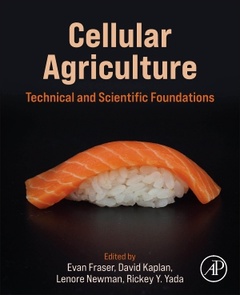Cellular Agriculture Technology, Society, Sustainability and Science
Coordonnateurs : Fraser Evan D. G., Kaplan David L., Newman Lenore, Yada Rickey Y.

Cellular Agriculture: Technology, Society, Sustainability and Science provides a state-of-the-art review of cellular agriculture technologies. From cell selection to scaffolding and everything in-between, this book contains chapters authored by leading cellular agriculture researchers and product developers across the world. Driven by consumer desire for sustainable food production, animal welfare improvements, and better human health, companies around the world are racing to engineer alternative protein products with the best flavour, appearance, and texture. A major challenge many of these early-stage companies struggle with is having the foundational science and technical knowledge to start their journey in this emerging industry. This text provides detailed information on the current state of the science and technology of cellular agriculture. It combines the social aspects that need to be considered to create a level playing field to give each emerging idea the best chance at realizing the ultimate vision of cellular agriculture: satisfying the demand for protein around the world in a way that is better for humans, animals, and the planet. This is the first resource of its kind to take a practical approach to review the design, feasibility, and implementation of cellular agriculture techniques. With additional chapters on life cycle analyses and ideal transition scenarios, this book provides a resource for aspiring technology developers and academics alike, seeking evidence-based assessments of the industry and its disruptive potential.
1. Introduction to The foundations of cellular agriculture: science and society
2. Cultivated meat: disruptive technology for sustainable meat production
3. Sustainable food systems, development paths, and scenarios for cellular agriculture
Section 2: A New Frontier for Protein: Novel Approaches and Novel Products
4. Alternative Proteins, Extrusion, and Bioprocessing
5. What should the properties of cultivated meat be?
6. Food Safety of Fermented Proteins and Cultivated Meat and Seafood
Section 3: Tissue Engineering and Cellular Agriculture: State of the Science and Technology
7. Introduction to Cultured Meat and Tissue Engineering
8. Cell Source and Types for Cultivated Meat Production
9. The Science of Stem Cells – and Stem Cell Engineering – for Cellular Agriculture
10. Scaffolds for Cultured Meat: Technological Considerations
11. Engineering Bioreactors
12. Cell Nutrition and Growth Media
13. 3D Bioprinting
14. Cell Fate and Patterning
15. Scientific Issues and Challenges with Production and Refining Edible Oils and Fats
16. Acellular Products from Cells
17. Manufacture of Hybrid Alternative Protein Food Products Using a Combination of Plant-based Ingredients, Fermentation-derived Ingredients and Animal Cells
18. Cultivated Poultry and Seafood: Opportunities and Future Challenges
Section 4: Fermentation- Derived Foods and Cellular Agriculture: State of the Science and Technology
19. Introduction to Fermentation Technologies and Techniques
20. The Role of Bacterial Cellulose in Cellular Agriculture
21. Case Study on Whey Protein from Fermentation
22. Introduction to commercial opportunities, future directions, and novel approaches to fermentation.
Section 5: Cellular Agriculture and Sustainability
23. The Potential for Cellular Agriculture to Help Reach the Sustainable Development Goals
24. Environmental impacts of cellular agriculture
25. Cellular Agriculture in the Circular Economy
26. Cellular Agriculture and Food Security, Nutrition and Public Health
27. The Promise of Cellular Agriculture
Section 6: Social, Legal and Ethical Dimensions
28. The Ethics of Cellular Agriculture
29. Cellular Agriculture and Intellectual Property Law
30. Techno-Economic Assessments of Cellular Agriculture
31. Education and Training
32. The Political Economy of Cellular Agriculture
Section 7: Conclusion
33. Cellular Agriculture and the Future of Food
Glossary of Terms
David L. Kaplan is Professor and Chair, Department of Biomedical Engineering, at Tufts University, USA. His research focus is on biopolymer engineering to understand structure-function relationships, with emphasis on studies related to self-assembly, biomaterials engineering and functional tissue engineering/regenerative medicine. He has published over 600 peer reviewed papers and edited eight books.
Lenore Newman is the Director of the Food and Agriculture Institute at the University of the Fraser Valley, and an Advisor for Cellular Agriculture Canada. She is an associate professor in the Faculty of Science at UFV where she holds a Canada Research Chair in Food Security and Environment. Lenore was a member of the Premier’s Food Security Task Force, sat on the BC Minister of Agriculture’s Advisory Committee on Revitalizing the Agricultural Land Reserve, and regularly speaks to government and community groups. She has published over fifty academic journal articles and book chapters, and her opinion pie
- Written by industry and academic experts for balanced perspective
- Presents foundational information with practical application insights
- Includes chapters on regulatory and policy issues
- Reviews the sustainability challenges of alternative proteins
Date de parution : 11-2023
Ouvrage de 576 p.
19x23.3 cm


